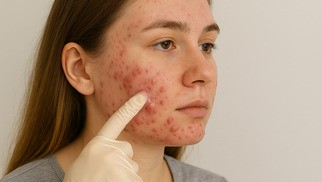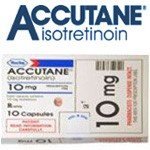Nodular and Conglobate Acne: Severe Forms of a Common Condition


Acne is one of the most prevalent dermatological conditions globally, affecting individuals across various age groups. While most people experience mild forms of acne that can be managed with basic skincare, some face more aggressive variants that require medical intervention. Among the most severe types are nodular acne and acne conglobata, both of which can cause significant discomfort, deep scarring, and emotional distress. Understanding these forms of acne, their characteristics, differences from other types, and available treatment options — particularly the role of Accutane (isotretinoin) — is essential for effective management.
What Is Nodular Acne?
Nodular acne is a severe and painful form of acne characterized by large, inflamed, and firm lesions called nodules. These nodules develop deep within the skin and do not typically come to a head like pimples or pustules. They may persist for weeks or even months and are usually more than 5 mm in diameter. The nodules are often red or skin-colored, and because of their depth and inflammation, they can damage the skin's structure and lead to long-term scarring.
Nodular acne usually arises when pores become deeply clogged with sebum (oil), dead skin cells, and bacteria, leading to a strong inflammatory response. This type of acne often resists over-the-counter treatments and requires prescription medication and dermatological supervision.
What Is Acne Conglobata?
Acne conglobata (AC) is considered one of the most severe and rare forms of acne. It is a chronic, inflammatory disease involving the formation of interconnected nodules, abscesses, and draining sinus tracts. These lesions are often found on the face, chest, back, buttocks, and upper arms. Unlike nodular acne, acne conglobata typically affects larger areas and includes a mix of comedones, nodules, and cystic lesions, often merging to form massive, painful inflamed areas.
Acne conglobata tends to occur more frequently in young adult males, though it can affect women as well. It may develop spontaneously or be triggered by factors such as anabolic steroid use, testosterone therapy, or an abrupt discontinuation of systemic corticosteroids. The emotional and physical impact of this condition is profound, often leaving extensive scarring and requiring aggressive, long-term treatment.
Nodular vs. Comedonal Acne: Key Differences
To better understand nodular acne, it is helpful to contrast it with comedonal acne, which is a milder form of the disease. Comedonal acne is primarily non-inflammatory and involves the formation of blackheads and whiteheads—small, plugged follicles that sit close to the skin’s surface. These lesions are not typically painful and are less likely to result in scarring.
In contrast, nodular acne is deep, painful, and highly inflammatory. It develops under the skin and often results in a delayed healing process. While comedonal acne might respond well to topical treatments like salicylic acid or benzoyl peroxide, nodular acne generally requires oral medications or specialized dermatological procedures.
Nodular vs. Pustular Acne
Another distinction worth clarifying is between nodular acne and pustular acne. Pustular acne involves inflamed pimples filled with pus—they are superficial and appear as white or yellow bumps on the skin’s surface. While pustules are a sign of inflammation and infection, they usually resolve more easily and are often less severe.
Nodular acne, on the other hand, develops much deeper within the skin and does not contain visible pus. The nodules are firm to the touch, often painful, and may take weeks to resolve. Due to their depth and inflammation, they pose a higher risk of scarring compared to pustules. Treatment for pustular acne might include topical antibiotics or retinoids, while nodular acne typically demands more potent systemic therapies.
Causes and Risk Factors
The exact cause of nodular and conglobate acne is multifactorial. At the root lies a combination of hormonal fluctuations, excessive sebum production, abnormal keratinization, and bacterial colonization, especially by Cutibacterium acnes. Hormonal changes during puberty, pregnancy, or due to conditions like polycystic ovary syndrome (PCOS) can increase the likelihood of developing severe acne.
Genetics also play a significant role. Individuals with a family history of severe acne are more likely to experience nodular or conglobate variants. Environmental and lifestyle factors, such as high dairy consumption, stress, poor hygiene, and certain medications, may also exacerbate the condition.
Complications and Impact
Beyond the visible symptoms, nodular and conglobate acne can significantly affect a person’s quality of life. The emotional toll includes low self-esteem, social withdrawal, and in some cases, depression or anxiety. Persistent inflammation can also cause permanent scars, including icepick, boxcar, and rolling scars, which are notoriously difficult to treat.
If not managed early and appropriately, these types of acne can progress and become refractory to treatment, requiring more aggressive interventions.
Treatment Options: The Role of Accutane
One of the most effective and well-established treatments for severe acne, particularly nodular and conglobate acne, is isotretinoin, commonly known by the brand name Accutane. This oral retinoid is a derivative of vitamin A and works by targeting the root causes of acne through multiple mechanisms.
Accutane significantly reduces sebum production by shrinking the oil glands, thereby limiting the environment in which acne-causing bacteria thrive. It also regulates skin cell turnover, preventing clogged pores, and has powerful anti-inflammatory properties that reduce the redness and swelling associated with nodular and conglobate acne.
For many patients, a single 4- to 6-month course of Accutane can lead to long-lasting remission. However, due to its potency, Accutane is associated with several potential side effects, including dry skin and lips, photosensitivity, joint pain, and elevated liver enzymes. In women, its use must be carefully managed due to a high risk of birth defects, requiring strict adherence to a pregnancy prevention program during treatment.
Despite these risks, isotretinoin remains the gold standard for severe acne when other treatments have failed. Dermatologists usually prescribe it after evaluating the patient’s medical history, conducting necessary blood tests, and discussing possible side effects.
Other Therapeutic Approaches
Although Accutane is highly effective, some patients may explore or require alternative or adjunctive therapies, including:
- Antibiotics such as doxycycline or minocycline to reduce bacterial growth and inflammation.
- Hormonal therapies like oral contraceptives or spironolactone for women with hormonal acne.
- Intralesional corticosteroid injections to rapidly reduce inflammation in individual nodules.
- Topical treatments like retinoids or benzoyl peroxide, often used in conjunction with oral medications.
- Laser therapies and chemical peels for scarring or residual inflammation.
Treatment plans are usually personalized, and dermatologists may combine several approaches for optimal results. Early and aggressive management is often key to minimizing the long-term physical and psychological impact of the condition.
Conclusion
Nodular and conglobate acne are among the most challenging and debilitating forms of acne. They extend beyond cosmetic concerns, often impacting patients' mental health, self-confidence, and social functioning. Unlike more common forms like comedonal or pustular acne, nodular and conglobate types require medical evaluation and systemic treatment.
The introduction of Accutane has revolutionized treatment, offering many patients a chance at long-term remission and significant skin improvement. However, due to its potency and risk profile, it must be prescribed and monitored carefully. Understanding the nature of these severe acne types and seeking timely, appropriate care is essential for preventing complications, minimizing scarring, and improving quality of life.
With the guidance of a skilled dermatologist and access to effective therapies, individuals suffering from nodular or conglobate acne can regain not only clearer skin but also confidence and comfort in their daily lives.
Article post: Editorial Team of RXShop.md
(Updated at May 29 / 2025)

